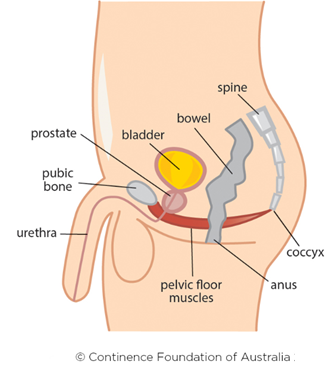Prostate Problems - ABOUT THE PROSTATE
The prostate is a gland found only in men. It is approximately 3cm in diameter (about the size of a walnut). The urethra (the tube that carries urine) passes through the prostate.
In younger men, the size of the prostate changes very little. As men age (particularly beyond 45–50 years) the prostate enlarges and can press on the urethra. This can cause an obstruction or blockage to the flow of urine that makes it difficult to completely empty the bladder.

SYMPTOMS
Men may notice any (or a combination) of the following urinary symptoms:
- slow and/or interrupted urine stream or flow
- difficulty in starting to pass urine
- needing to pass urine more often
- feeling that the bladder hasn’t emptied completely
- dribbling urine after passing urine, or between toilet visits
- urgency or rushing to pass urine due to the bladder having to work hard to overcome the obstruction or blockage, which can also cause urge incontinence
- needing to get up one or more times per night to pass urine (nocturia)
- needing to go to the toilet again shortly after passing urine
- burning or discomfort when passing urine
- blood-stained urine
- passing little or no urine (urinary retention). This needs immediate medical attention.
INCONTINENCE AFTER PROSTATE SURGERY
Incontinence is a common problem for men after prostate surgery (also known as prostatectomy or Transurethral Resection of the Prostate (TURP)).
Often men find this the biggest challenge in the recovery process.
Why does it happen?
- At the point where the bladder and urethra join, there is a ring of muscles known as the bladder neck sphincter, which opens and closes like a camera shutter. The bladder neck sphincter is closed most of the time to prevent urine leaking out, but when it gets a signal from the brain, it opens to allow urine to be passed.
- If the bladder neck sphincter is damaged during prostate cancer surgery, this can lead to urinary incontinence.
- Another (external) sphincter is part of another set of muscles below the prostate called the pelvic floor. These muscles are also involved in bladder control.
Most men regain their bladder control over time and are fully recovered within 6 to 12 months. It is important to get professional advice to help manage bladder weakness during this time.
WHAT YOU CAN DO TO HELP
Incontinence will usually improve with time, but there are things you can do to help regain control over your bladder:
Exercise your pelvic floor muscles
Learning how to control the pelvic floor muscles can speed up the recovery process and reduce leakage. If you don't strengthen these muscles, the leakage may persist.
Please note: Performing pelvic floor muscle exercises before and after prostate surgery is vital to your recovery. Resume pelvic floor exercises once the catheter has been removed to avoid bladder irritation and discomfort. It is recommended that you seek help from a men’s, women’s and pelvic health physiotherapist, Nurse Continence Specialist, or urology nurse to learn the correct technique.
More information about the pelvic floor muscles can be found on our pelvic floor and male pelvic floor pages. You can also learn more about pelvic floor friendly exercises at pelvicfloorfirst.org.au.
Drink enough
Drink enough fluids. You can speak to your doctor about how much fluid intake is right for you. Limit caffeine, alcohol and fizzy drinks as they may cause bladder irritation.
Eat well
Eat a healthy diet rich in dietary fibre and make sure your diet has an adequate amount of fresh fruit, vegetables and cereals.
Practice good toilet habits
Go to the toilet when your bladder feels full – don’t get into the habit of going just in case. After prostate surgery you may find that you do not experience the sensation of a full bladder. The sensation of a full bladder will gradually return as you are able to hold on longer. It is important to practice holding on to increase the amount of urine your bladder can hold.
Lean more about incontinence prevention.
SEEK HELP
In many cases incontinence can be better managed and cured. Talk to your doctor, urologist, or contact the National Continence Helpline on 1800 33 00 66.
The National Continence Helpline is staffed by Nurse Continence Specialists who offer free and confidential information, advice and support. They also provide a wide range of continence-related resources and referrals to local services.

